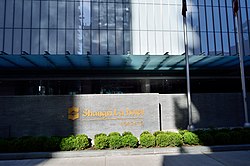Shangri-La Toronto
| Shangri-La Toronto | |
|---|---|
 | |
 | |
| General information | |
| Type | Hotel and residential |
| Location | 188 University Avenue Toronto, Ontario M5H 0A3 |
| Coordinates | 43°38′56″N 79°23′10″W / 43.649°N 79.386°W |
| Construction started | February 2008 |
| Opened | October 2012 |
| Height | |
| Roof | 214 m (702 ft) |
| Technical details | |
| Floor count | 65 (plus 8 parking levels below)[1] |
| Floor area | 81,129 m2 (873,270 sq ft) |
| Lifts/elevators | 17 |
| Design and construction | |
| Architect(s) | James K. M. Cheng |
| Architecture firm | Hariri Pontarini Architects |
| Developer | Westbank Projects Corp. |
Shangri-La Toronto is a luxury hotel and residential condominium building in downtown Toronto, Ontario, Canada. It was designed by James K. M. Cheng and built by Westbank Projects Corp.; they also designed and built the Living Shangri-La in Vancouver. The building is 214 meters tall and is one of the fifteen tallest buildings in Toronto. The hotel component is run by Shangri-La Hotels and Resorts and has 202 guest rooms and suites.[2] The condominium portion occupies the upper floors of the building and consists of 393 units.[3] Excavation of the site started in 2008, and work on the parking garage began in early 2009.
History
[edit]
Shangri-La Toronto is located on University Avenue and Adelaide Street, in an area just west of the Financial District that has seen rapid growth in recent years. The site was previously home to a number of smaller structures, most notably the historic Bishop's Block. The Bishop's Block was built in the 1830s by John Bishop, who built a series of Georgian row houses on the site.
Most buildings were eventually torn down and replaced with a large parking lot. The one exception was a structure that served as one of the city's first hotels and then for many decades as a pub, the Pretzel Bell Tavern, which became a popular hangout of the Maple Leafs.[4] It too was abandoned for several decades, but as a heritage structure, it was not torn down. This building was disassembled for the construction of Shangri-La Toronto, but the developers had pledged to rebuild and restore the Bishop's Block as part of the project.
Before excavation, the site was the subject of several months of archaeological exploration, and many artifacts from the city's early history were found. At 102 ft (31 m), Shangri-La Toronto was the second-deepest excavation for a building in Canada's history, with only Scotia Plaza being deeper.[5] This was done to create an eight-level below-grade parking garage.
See also
[edit]References
[edit]- ^ "Shangri-La". Hariri Pontarini Architects. Retrieved 20 September 2023.
- ^ Shangri-La Hotel, Toronto
- ^ "Hariri Pontarini Architects". Archived from the original on 2018-09-03. Retrieved 2016-01-30.
- ^ Cowan, James (May 10, 2006). "No objections as city approves two towers". The National Post.
- ^ The deepest excavation in the City of Toronto at a depth of 31m (of any u/c buildings)
- Gray Jeff, "Hotel-condo complex gets committee nod" The Globe and Mail
- Hume, Christopher. "Brief window into the past: Archeologists have 4 months to excavate a former upscale neighbourhood before another is built." Aug 06, 2007.
External links
[edit] Media related to Shangri-La Toronto at Wikimedia Commons
Media related to Shangri-La Toronto at Wikimedia Commons- Shangri-La Hotel, Toronto - official website
- Hariri Pontarini Architects - Shangri-La Toronto Archived 2018-09-03 at the Wayback Machine
